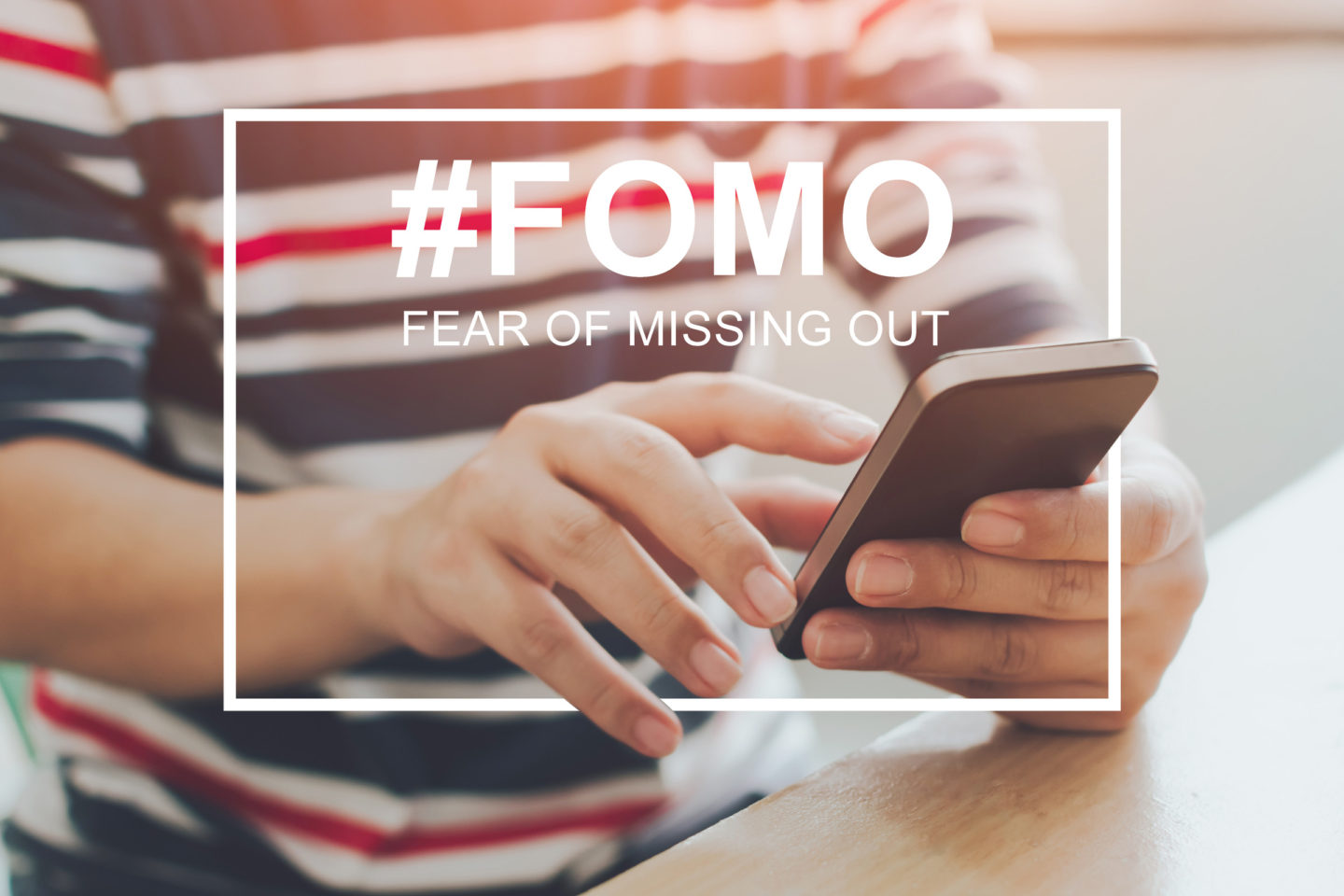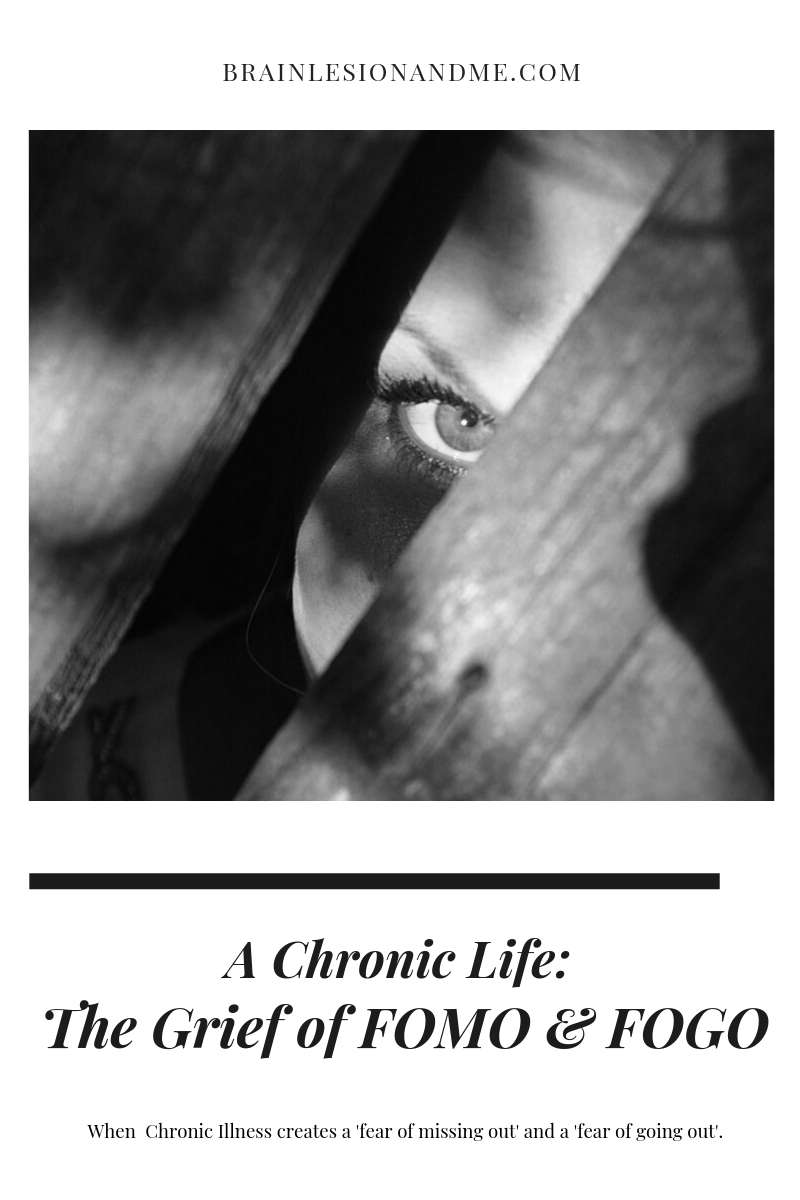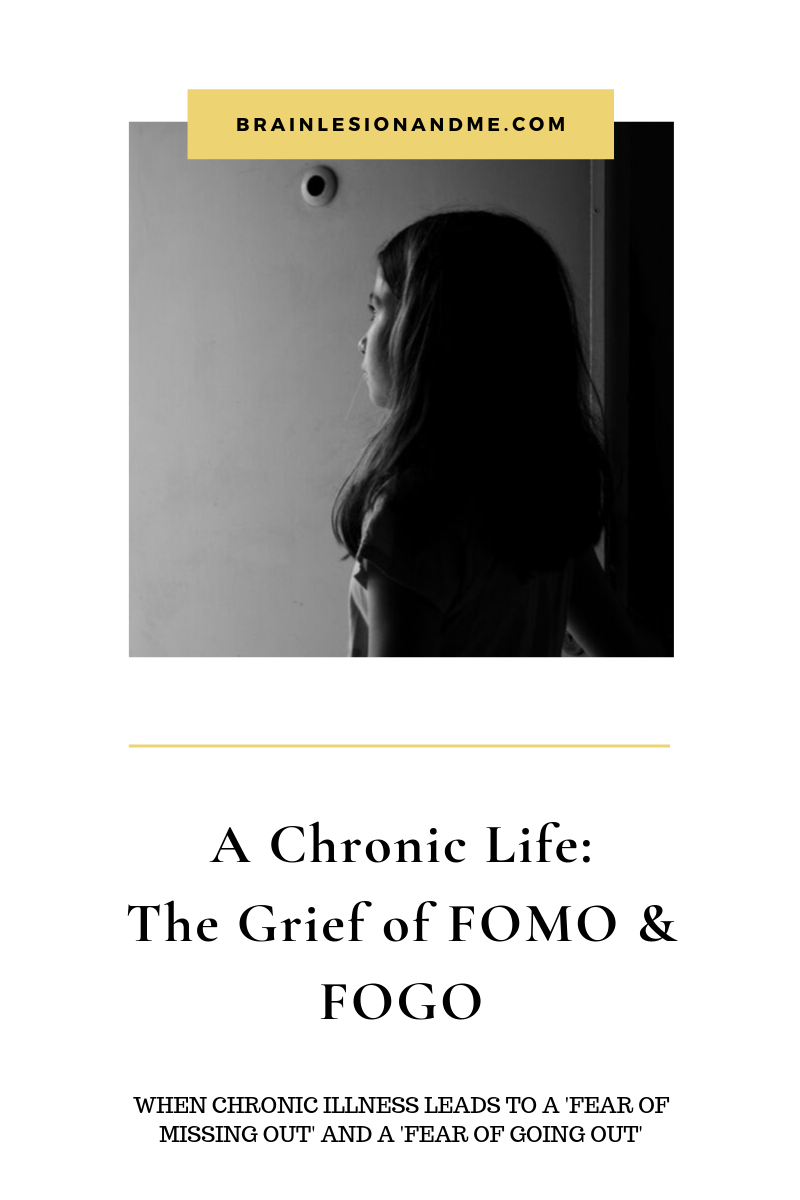The Rise of FOMO Due To The Social Media Crazed World
In this social media crazed world we live in has borne FOMO, the “fear of missing out.”

An anxiety-inducing feeling of being left out of something everybody else is doing, or knows about, or owns. It’s the pressure of never wanting to turn your phone off in case of a missed notification or refusing to turn down an invite to a party in case of losing your social standing. And a want to do everything at once to feel included.
"FOMO is the pressure of never wanting to turn your phone off in case of a missed notification or refusing to turn down an invite to a party in case of losing your social standing. A want to do everything to feel included." Click To TweetAnd the feeling of FOMO is intensified as we bear witness of friends, family and acquaintances having a brilliant time via social media.
The Fear of Missing Out Becomes A Way of Life When Living With Chronic Illness
Living with a chronic illness often hinders you from going out, forced to stay inside and observe the fun of the outside world from our screens. As such, FOMO is not just a feeling but becomes a way of life.
There isn’t anybody that would wish to miss out on experiencing the joy of being part of celebrations in the lives of friends or family. Nobody wants to feel left out or feeling they are experiencing life behind a screen. We want to be experiencing life, instead of merely being a bystander to everything it has to offer.
"Living with a chronic illness often hinders you from going out, forced to stay inside and observe the fun of the outside world from our screens. As such, FOMO is not just a feeling but becomes a way of life." Click To TweetBut when living with a chronic illness, and the unpredictability that it brings, missing out becomes another new reality. The existence of FOMO and its presence in this new life is something else we must grieve and learn to accept.

Staying in the confines of our home becomes a necessity, not a choice. There is no real choice as debilitating, and relenting symptoms continue to ravage the body. Symptoms so out of control that the prospect of going out feels like an impossible challenge. So, staying in, it becomes; forced to become a spectator of missed fun as we scroll through our social media feeds.
"Symptoms often become so out of control that the prospect of going out feels like an impossible challenge. So, staying in, it becomes; forced to become a spectator of missed fun as we scroll through our social media feeds." Click To TweetBut perhaps FOMO is inadequate to describe the depths of feelings it provokes in those living with chronic illness. It’s not fear, but feelings of sadness, angst, regret and anger at chronic illness for it taking so many things from you, lost forever.
The Guilt of FOMO
If the sadness and disappointment that FOMO creates aren’t enough to contend with, unfortunately, it is also accompanied by guilt. The guilt for bot being able to make it to a friend’s birthday celebration, or a wedding. Guilt, for not only not attending, but also knowing the disappointment felt by those whose celebrations we are missing.
As we sit at home, missing out, we torture ourselves, thinking that if only we pushed ourselves a little more, we could have gone. The reality is, however, is if we had pushed ourselves, it would only result in exacerbating symptoms, making the situation worse. The truth is, we are forced to miss out on things because we are not well.
"Pushing ourselves to attend events although will oust the guilt of not going, often results in exacerbating symptoms and make us feel even worse. The truth is, we are forced to miss out on things because we are not well." Click To TweetFOMO shines a mirror on our old life, the normal that used to be our reality. And it reminds us that chronic illness and our fragile bodies have decimated normal, emphasising this new reality and our new life of missing out.
Chronic Illness Inconveniences, and Not Only For The Person Living With It
As this new reality continues, symptoms persisting and enduring further FOMO, a new consequence of always cancelling and missing out becomes evident.
If unable to attend events and celebrations, and forced to cancel at the last minute again and again, then consequently people will stop inviting you to stuff.
Chronic illness and everything that it brings and takes away is an inconvenience and not just for the person living it. And so, whether to make it easier for them or us, invitations are no longer given. It hurts being seemingly cut out of the lives of those we care about, with no regard to our feelings.
From FOMO To FOGO
Ironically, another consequence of FOMO is the development of FOGO. What is FOGO, I hear you ask? It’s the Fear of Going Out. After cancelling and not being able to make events, a fear of making plans and going out evolves. Furthermore, after spending so much time indoors, in the comfort and safety of home, it can be anxiety-provoking when venturing outside again.
There is an anticipation that a flare-up of symptoms will result in the cancellation of plans of going out. The mere thought of going out starts to become unobtainable. And in the unlikely event going out is an option, a fear of becoming ill comes into existence. It is preempting a flare of symptoms before it’s even become a reality.
"In the unlikely event going out is an option, a fear of becoming ill comes into existence. It is preempting a flare of symptoms before it's even become a reality." Click To TweetThe fear of going out, however, does not equate to me not going out when symptoms allow me. The reality of living with a chronic illness often leads to overanalysing and questioning every decision made. A worry exists that the very act of going out will lead or exacerbate symptoms.
Feeling Unsafe; a Prisoner In An Unpredictable Body
FOGO develops as a result of a loss of self-confidence. The neurological condition I live with recently has recently caused weakness, debilitating trembling in the legs, and falls. In recent weeks, I have regularly been finding myself on the floor, as legs give way with no warning. Such symptoms have made me feel unsafe and afraid of my own body. And no longer confident in my body’s ability to keep me safe and free from harm.
"Debilitating and unrelenting symptoms have made me feel unsafe and afraid of my own body. And no longer confident in my body's ability to keep me safe and free from harm." Click To TweetContinually living with severely trembling legs, acutely aware of the unpredictability of such symptoms. Recognising that at any moment they could suddenly stop working and collapse causes anxiety, especially when it involves leaving home and the safety of our comfort zone.
Falling over hurts, no matter how many times you have experienced it, it still hurts. And falling over in public can be even worse, especially with the feel of eyes of people staring. The awareness of that it could happen when we next go out, unable to stop it, it can often be easier not to go out at all.
"Falling over hurts, no matter how many times you have experienced it, it still hurts. And falling over in public can be even worse, especially with the feel of eyes of people staring." Click To TweetChronic Illness Creates Fear and a Fear of Going Out
Living with a neurological condition and such unpredictable symptoms create fear of the unknown as well as what could happen. A knowledge exists that the ‘what could happen’ is very likely to happen again, but not when can frighten.
All the accompanying symptoms of FND make me fear my own body, waiting with bated breath for the next fall or accident. We live inside unpredictable bodies that don’t work as they should – trapped inside a body that keeps us from living. And the worst thing is there is no escape – no relaxing holidays from the debilitating symptoms that suddenly pop-up every day. Sometimes there’s even no cures for them, or little in the way of effective treatments. And we become scared; scared of getting worse and becoming sicker and frailer. We don’t feel safe.
It creates fear and a fear of going out.
"We live inside unpredictable bodies that don’t work as they should – trapped inside a body that keeps us from living. And the worst thing is there is no escape. It creates fear and a fear of going out." Click To Tweet
